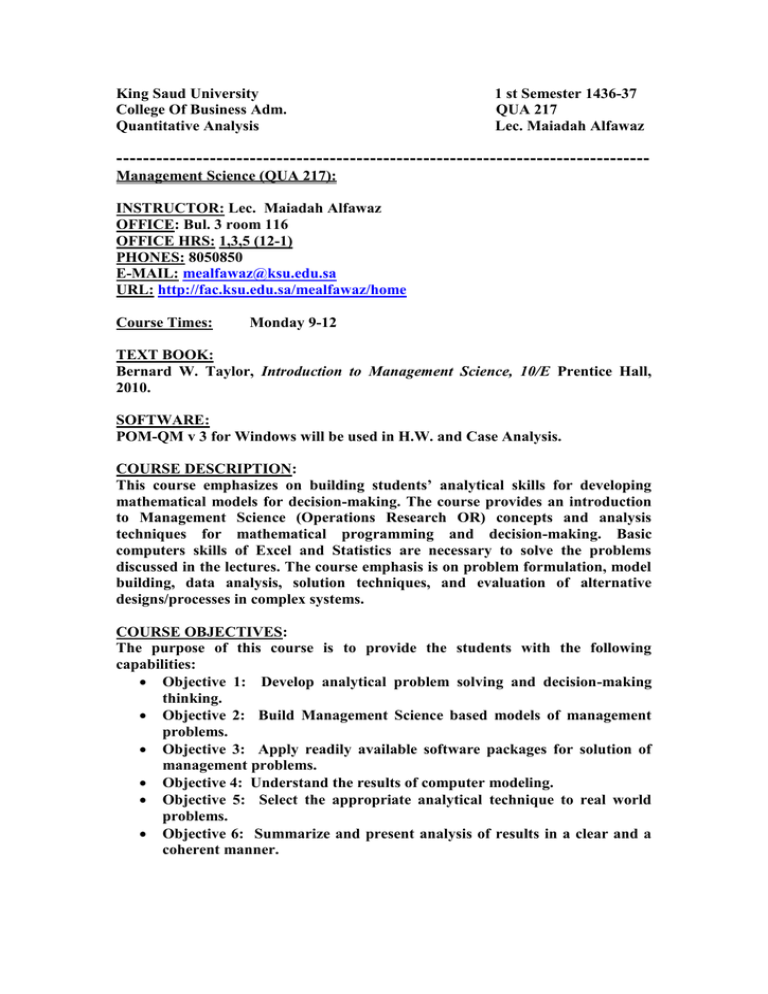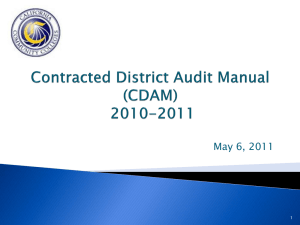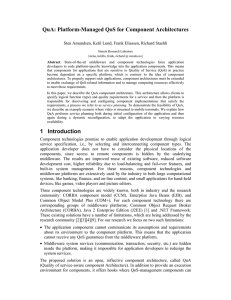Management Science (QUA 217)
advertisement

King Saud University College Of Business Adm. Quantitative Analysis 1 st Semester 1436-37 QUA 217 Lec. Maiadah Alfawaz -------------------------------------------------------------------------------Management Science (QUA 217): INSTRUCTOR: Lec. Maiadah Alfawaz OFFICE: Bul. 3 room 116 OFFICE HRS: 1,3,5 (12-1) PHONES: 8050850 E-MAIL: mealfawaz@ksu.edu.sa URL: http://fac.ksu.edu.sa/mealfawaz/home Course Times: Monday 9-12 TEXT BOOK: Bernard W. Taylor, Introduction to Management Science, 10/E Prentice Hall, 2010. SOFTWARE: POM-QM v 3 for Windows will be used in H.W. and Case Analysis. COURSE DESCRIPTION: This course emphasizes on building students’ analytical skills for developing mathematical models for decision-making. The course provides an introduction to Management Science (Operations Research OR) concepts and analysis techniques for mathematical programming and decision-making. Basic computers skills of Excel and Statistics are necessary to solve the problems discussed in the lectures. The course emphasis is on problem formulation, model building, data analysis, solution techniques, and evaluation of alternative designs/processes in complex systems. COURSE OBJECTIVES: The purpose of this course is to provide the students with the following capabilities: Objective 1: Develop analytical problem solving and decision-making thinking. Objective 2: Build Management Science based models of management problems. Objective 3: Apply readily available software packages for solution of management problems. Objective 4: Understand the results of computer modeling. Objective 5: Select the appropriate analytical technique to real world problems. Objective 6: Summarize and present analysis of results in a clear and a coherent manner. CLASS PROCEDURE: The procedures followed in this class will be similar to those followed in other Business courses. The primary method of instruction is lecture with student participation, including in-class group work. We will use class time to further develop the material from the chapters, not review it. Hence, it is to your advantage to read the chapters before class. First Class will be the main method of communication of assignments and other course-related material. HOMEWORKS: Homework sets are assigned frequently. These are intended to help you become more familiar with the application of the concepts covered in this course, and prepare you for the exams. The homework assignments may be discussed with classmates. EXAMINATIONS: There will be two midterms and a final exam. Each midterm will cover about one third of the material and is scheduled to take 60 minutes. The final will be given at the time set by the University. It will be cumulative. Exceptions to the policy of taking the final at the time scheduled are rare. GROUP CASES: Groups of 3-4 members each will be assigned to work on few small cases during the semester. Because your grade on this assignment depends on the quality of the whole group, I encourage you to start planning early on who you want in your group. ATTENDANCE: Attendance is expected, and will be tracked daily using a sign-in sheet. Since this class meets fewer than 30 times, missing more than 7 sessions is considered excessive and will adversely affect your final course grade. In addition, poor attendance explicitly affects your class participation score. If you miss class, I expect you to get the notes and be familiar with the material by the next class. You are responsible for all material covered in class during your absence, including new assignments. Grades: Mid-Term Exam: Case Analysis, Presentation, & H Final Exam: Total: 50% (TBA) 10% 40% (TBA) 100% Course Outlines: Introduction to Quantitative Methods (OR & Statistics): Outside reading Ch1: Introduction to Management Science Ch 2: Linear Programming: Model Formulation and Graphical Solution Ch3: Linear Programming: Computer Solution and Sensitivity Analysis Ch4: Linear Programming - Modeling Examples Ch5: Integer Programming Ch6: Network Models: Transportation & Assignment Problems only Ch7: Network flow Models. Ch8: Project Scheduling (CPM, PERT)






